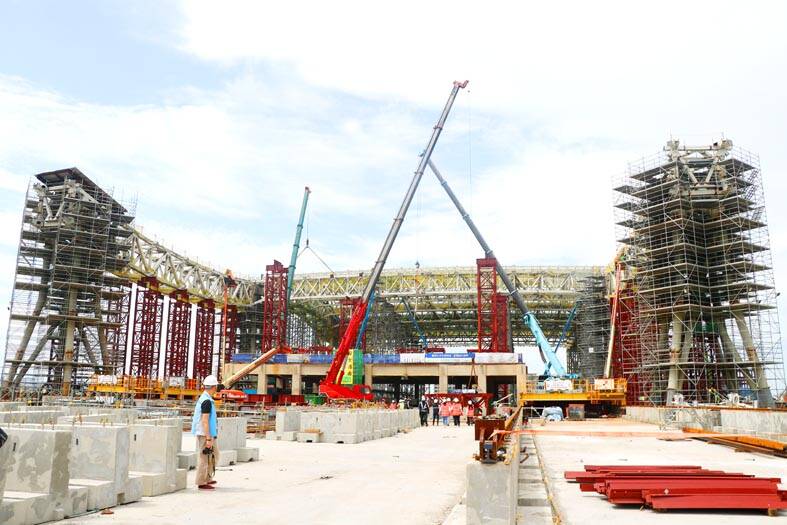The north concourse of Taiwan Taoyuan International Airport’s Terminal 3 is scheduled to begin operations in the middle of next year, Taoyuan International Airport Corp (TIAC) said yesterday.
The Terminal 3 project was launched as the number of air travelers accessing the nation’s largest international airport each year has already exceeded the combined capacity of terminals 1 and 2.
The two existing terminals were designed to be accessed by 37 million air travelers per year. Prior to the COVID-19 pandemic, about 48.36 million accessed the airport in 2019.

Photo: Tsai Yun-jung, Taipei Times
The airport operator yesterday organized a field trip for reporters to see Terminal 3 construction sites.
TIAC chairman Yang Wei-fuu (楊偉甫) told reporters that 26 million air travelers had accessed the airport as of last month, and the number of the air travelers accessing the airport this year could potentially be 44 million to 45 million, which is about 92 to 94 percent of the 2019 level.
Once Terminal 3 is completed, the airport’s passenger service capacity would expand to 82 million travelers per year from 37 million, Yang said.
The company estimated that more than 50 million passengers are to access the airport per year by 2028.
Based on the company’s plan, Terminal 3 would be mainly used for flight services connecting North America and Southeast Asian nations offered by China Airlines, EVA Airways and Starlux Airlines.
As of last month, the nation had welcomed about 3.936 million transit passengers, up from 3.46 million during the same period last year.
About 77 percent of the airport’s transit passengers this year were those traveling between North America and Southeast Asia, TIAC data showed.
Approximately 40 percent of transit travelers flew from the US or Canada to Southeast Asian nations, data showed.
So far, 42.3 percent of the Terminal 3 project — the terminal, aprons, taxiways, substations, an energy center and an office building — has been completed, about 1 percent behind the construction schedule, the company said.
Although the entire Terminal 3 project would not be completed until 2027, the north concourse is scheduled to begin operations in the middle of next year, which could add eight more aircraft parking spaces to the airport, the company said.
The cost of the project is now estimated to be NT$128.37 billion (US$3.97 billion), up from the previous estimate of NT$95.6 billion, due to inflation and other factors, the company said.
The terminal per se costs about NT$44.53 billion. Its rooftop area is about 100,000m2, which is nearly three times larger than the Taipei Dome. The aggregate floor area is about 580,000m2, the company said.
Yang cited the COVID-19 pandemic and the high turnover rate of migrant workers as the two biggest challenges the project has faced, adding that the problem with the migrant workers was addressed by changing human resources agencies.
TIAC sustained substantial financial losses due to the COVID-19 pandemic, turning it from a profitable firm to one in debt.
As of last year, the company had NT$5.4 billion of accumulated financial losses, Yang said.
“We have a very good chance to cover the losses this year due to the return of air travelers. However, we still need to spend about NT$300 billion in the next few years building the third runway and other infrastructure,” he said.

Taiwanese can file complaints with the Tourism Administration to report travel agencies if their activities caused termination of a person’s citizenship, Mainland Affairs Council Minister Chiu Chui-cheng (邱垂正) said yesterday, after a podcaster highlighted a case in which a person’s citizenship was canceled for receiving a single-use Chinese passport to enter Russia. The council is aware of incidents in which people who signed up through Chinese travel agencies for tours of Russia were told they could obtain Russian visas and fast-track border clearance, Chiu told reporters on the sidelines of an event in Taipei. However, the travel agencies actually applied

Japanese footwear brand Onitsuka Tiger today issued a public apology and said it has suspended an employee amid allegations that the staff member discriminated against a Vietnamese customer at its Taipei 101 store. Posting on the social media platform Threads yesterday, a user said that an employee at the store said that “those shoes are very expensive” when her friend, who is a migrant worker from Vietnam, asked for assistance. The employee then ignored her until she asked again, to which she replied: "We don't have a size 37." The post had amassed nearly 26,000 likes and 916 comments as of this

New measures aimed at making Taiwan more attractive to foreign professionals came into effect this month, the National Development Council said yesterday. Among the changes, international students at Taiwanese universities would be able to work in Taiwan without a work permit in the two years after they graduate, explainer materials provided by the council said. In addition, foreign nationals who graduated from one of the world’s top 200 universities within the past five years can also apply for a two-year open work permit. Previously, those graduates would have needed to apply for a work permit using point-based criteria or have a Taiwanese company

The Shilin District Prosecutors’ Office yesterday indicted two Taiwanese and issued a wanted notice for Pete Liu (劉作虎), founder of Shenzhen-based smartphone manufacturer OnePlus Technology Co (萬普拉斯科技), for allegedly contravening the Act Governing Relations Between the People of the Taiwan Area and the Mainland Area (臺灣地區與大陸地區人民關係條例) by poaching 70 engineers in Taiwan. Liu allegedly traveled to Taiwan at the end of 2014 and met with a Taiwanese man surnamed Lin (林) to discuss establishing a mobile software research and development (R&D) team in Taiwan, prosecutors said. Without approval from the government, Lin, following Liu’s instructions, recruited more than 70 software